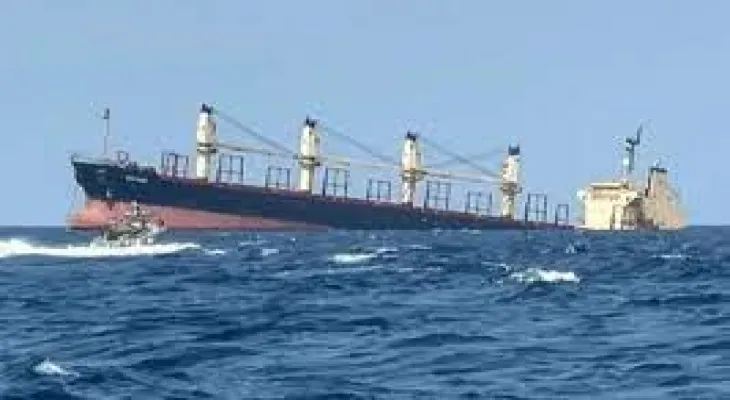Search here
Newspaper
Search here

Arab Canada News
News

Published: March 3, 2024
The U.S. military announced that a ship owned by a British company, which was attacked by the Houthis last month, sank in the Red Sea, reiterating a warning issued by the internationally recognized Yemeni government about the danger posed by the ship's load of fertilizers to marine life.
The ship "Ruby Mar," flying the Belize flag, is the first ship to sink since the Houthis began targeting commercial ships last November, forcing shipping companies to reroute ships along the longer and more expensive route around the southern tip of Africa, which also disrupted global trade due to shipment delays.
Severe consequences
Maritime security expert Dr. Ali Al-Dahab told Yemeni media that there are significant impacts from the sinking of the Ruby Mar ship, especially regarding the flow and passage of commercial ships through Bab al-Mandab and the Suez Canal, as ships will increasingly move through the Cape of Good Hope and around the African continent.
Dr. Ali Al-Dahab said the greatest security risks affecting the countries of the region will be the military measures taken by the U.S., Britain, and Western countries to confront Houthi attacks and their targeting of commercial ships and marine shipping tankers.
The same spokesperson did not rule out that global maritime companies might take measures according to alliances among themselves towards ports under Houthi control, especially the ports of Hodeidah, and impose on ships to refrain from docking there or unloading their commercial and oil cargoes.
American experts in the Department of Earth and Environmental Sciences indicate that the overall impact depends on how the water currents deplete the fertilizers and how they are released from the stricken ship.
The southern Red Sea ecosystem is distinguished by coral reefs, coastal mangrove trees, and diverse marine life.
According to experts, “If the ship is saved before a major leak occurs, it may be possible to prevent a major environmental disaster.”
Last year, the region avoided an environmental disaster when the United Nations successfully removed more than a million barrels of oil from a deteriorating giant tanker that was anchored off the coast of Yemen. Such operations may be more difficult under current conditions.
Imminent risks
Dr. Abdul Qader Al-Kharraz, associate professor of environmental impact assessment at the University of Hodeidah, says the sinking of the Ruby Mar ship constitutes a large and dangerous environmental disaster, whether for the Yemeni people or marine life in Yemeni territorial waters and fishing areas in this vital region.
Al-Kharraz, a former head of Yemen’s Environmental Protection Authority, emphasized that the risks to the marine environment are very great, represented by the contamination of seawater with highly hazardous fertilizers.
He pointed to several factors that clarify the disaster of the sinking of the Ruby Mar ship as follows:
- The materials carried by the ship of ammonium phosphate fertilizers will dissolve in sea water and pollute it, leading to a decrease in dissolved oxygen in the water, which will cause the death of marine creatures, while some of them—such as mollusks and fish—will carry these toxins and transfer them through fishing into the higher food chain, affecting coastal communities and even inland areas in Yemen, possibly leading to the spread of cancerous diseases.
- The Ruby Mar ship was built in 1997, meaning it has been operating for 27 years, and thus it is also considered waste based on its expected lifespan, which does not exceed thirty years.
- The sunk cargo of Ruby Mar amounts to 41,000 tons, and it was announced that it carries 20,000 tons of hazardous chemical fertilizers; the type of the remaining half of the ship's cargo was not clarified, knowing that these fertilizers consist of bulk, unpackaged ammonium phosphate, and also include other chemicals.
Government Calls
Regarding the incident, a statement from the Yemeni government and a statement from the U.S. Central Command said the "Ruby Mar" ship sank in the southern Red Sea early Saturday.
Ahmed Awad Bin Mubarak, Prime Minister and Minister of Foreign Affairs, said in a post on X, “The sinking of the Ruby Mar ship is an environmental disaster unprecedented in Yemen and the region.” He added, “It is a new tragedy for our country and people, as we pay daily the price of the Houthi militia’s adventures.”
Ali Al-Sawalmeh, director of the Marine Science Station at the University of Jordan, told Reuters that the release of about 41,000 tons of fertilizers into the Red Sea waters poses a serious threat to marine life.
Al-Sawalmeh added that the overload of nutrients can stimulate excessive algae growth, leading to oxygen depletion so that marine life cannot survive.
He stressed the necessity for Red Sea countries to adopt an urgent plan to set a monitoring agenda for polluted areas in the Red Sea and to adopt a strategy for purification.
The U.S. military earlier said the attack caused significant damage to the cargo ship and caused an oil slick 29 kilometers long, adding that it was carrying more than 41,000 tons of fertilizers when it was attacked.
Comments